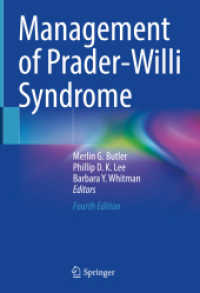- ホーム
- > 洋書
- > 英文書
- > Psychology
Full Description
Infancy research and philosophy explore "first things," yet few books bring the two fields into contact. Stephen Langfur's Philosophy Meets the Infant integrates groundbreaking infancy studies of the last 50 years to offer a fresh exploration of our drive for human connection. He begins with a new understanding of self-awareness, which he locates in reciprocal attention between baby and caregiver. Instead of "I think, therefore I am," the new research supports "You attend, therefore I am." The event of becoming self-aware through another is termed a "You-I Event."
The idea is counterintuitive: we are perfectly self-aware when alone! To explain the change after infancy, Langfur makes transformative use of an old psychoanalytic finding. With the onset of language, a child internalizes (introjects) the most important You's, playing them toward herself in speech. Instead of the original You-I Event, we have its counterfeit in our heads. Nevertheless, a longing for the true Event persists in the unconscious; individual chapters trace this longing in work, love, art, conversation, and religion.
Organized into three parts ("The You-I Event in infancy and why it disappears," "The You-I Event after infancy," and "Philosophical Issues"), this book will be of keen interest to philosophers, infancy researchers, and anyone seeking new light on the major questions of human existence.
Contents
Part 1: The You-I Event in infancy and why it disappears
1 Introducing the You-I Event
2 Born to connect
3 Becoming I through a You
4 Counterfeiting the You-I Event
Part 2: The You-I Event after infancy
5 Heidegger's hammer and the spectral You
6 Love and the precluded You
7 The split-off self in action
8 The You-I Event in art
9 The You-I Event in conversation
Part3: Philosophical issues
10 Other accounts of self-awareness
11 Free will and the You-I account
12 The call of conscience
13 God or the precluded You
14 What can be done
Appendix: Replies to imagined critics
Acknowledgments
Index
-

- 電子書籍
- 沈黙の庭園【タテヨミ】第31話 pic…
-

- DVD
- 姿なき殺人者






